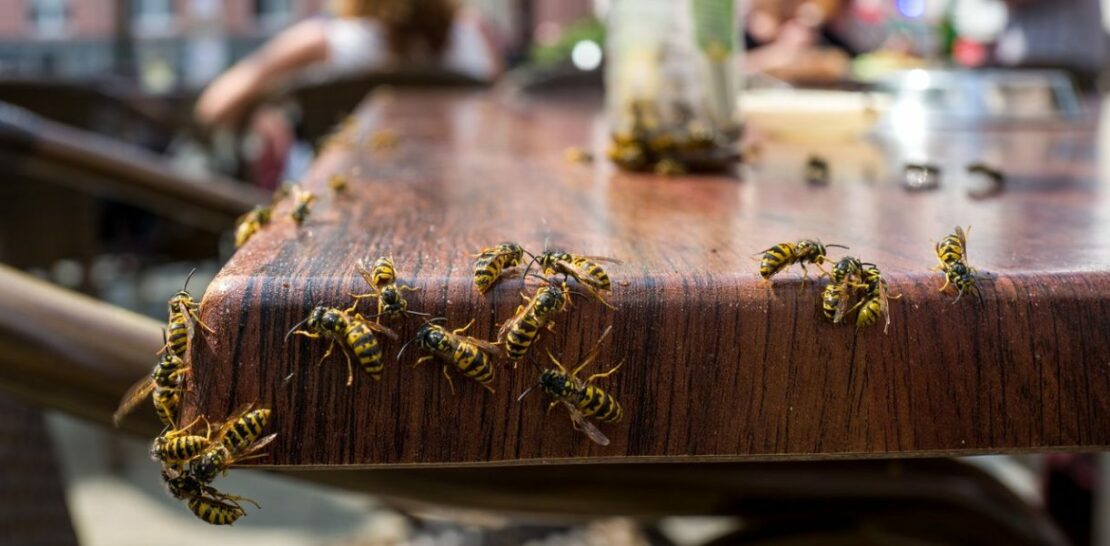Wasps are notorious for their painful stings and aggressive behavior, which can be dangerous to people and pets alike.
While commercial chemical-based pesticides are effective at eliminating wasps, they also pose risks to the environment and human health.
Therefore, it is essential to explore natural ways to get rid of wasps without resorting to harmful chemicals.
In this comprehensive article, we will discuss 5 natural methods to effectively remove wasps from your home and surroundings.
These methods are not only safe for you and the environment but also cost-effective and easy to implement.
1. Utilize Natural Wasp Repellents
One of the most effective ways to deter wasps from making a home in your property is by using natural repellents. These repellents can be applied in various forms, such as plants, essential oils, and homemade sprays.
- Plant Wasp-Repelling Plants: There are several plants that emit a strong odor that wasps find unpleasant. By planting these in strategic locations around your home, you can create a natural barrier to discourage wasp infestations. Some of these plants include mint, basil, wormwood, and lemongrass.
- Essential Oils: Many essential oils, such as peppermint, eucalyptus, and clove, are known to repel wasps. You can create a mixture of water and a few drops of your chosen essential oil in a spray bottle and spray it in areas where wasps are known to congregate or build nests.
- Homemade Wasp-Repelling Sprays: In addition to essential oils, you can create a homemade wasp-repellent spray using common household ingredients. For example, a mixture of water, white vinegar, and a few drops of dish soap can be an effective deterrent when sprayed on nests or in areas frequented by wasps.
2. Remove Sources of Attraction and Nesting
Preventing wasps from being attracted to your property is another crucial step in ensuring a wasp-free environment. By eliminating sources of food, water, and suitable nesting locations, you can greatly reduce the likelihood of a wasp infestation.
- Food Sources: Wasps are attracted to sweet and protein-rich foods. To prevent wasps from being drawn to your property, ensure that garbage cans are tightly sealed, pet food is stored indoors or covered, and fallen fruit is promptly removed from your yard.
- Water Sources: Wasps require a consistent source of water, so eliminating potential water sources such as birdbaths, leaky faucets, and standing water can help deter them from your property.
- Nesting Locations: Wasps typically build their nests in sheltered locations such as eaves, porches, and tree branches. Regularly inspect these areas and remove nests as soon as they are spotted. Additionally, sealing any gaps or cracks in your home’s exterior can prevent wasps from entering and building nests inside.
3. Use Traps to Catch Wasps
Trapping wasps is another eco-friendly approach to control the wasp population around your home. There are several types of traps available, ranging from store-bought traps to homemade solutions. While these traps may not eliminate an entire colony, they can help reduce the number of wasps in the area.
One popular homemade wasp trap involves cutting the top off a plastic bottle, inverting it, and placing it back into the bottom half of the bottle to create a funnel. Fill the bottom half with a sweet liquid, such as sugar water or fruit juice, to attract wasps. Once the wasps enter the trap, they are unable to escape and eventually drown. This trap should be placed away from your home to avoid attracting more wasps to the area.
4. Employ Biological Control Methods
Introducing natural predators into your environment can be an effective way to control wasp populations. These predators not only help keep wasp numbers in check but also contribute to a balanced ecosystem.
- Birds: Many bird species, such as sparrows, starlings, and magpies, are known to feed on wasps and their larvae. Encourage birds to visit your property by providing birdhouses and feeders.
- Insects: Certain insects,such as praying mantises, dragonflies, and spiders, are natural predators of wasps. Incorporating plants that attract these beneficial insects into your garden can help keep wasp populations under control. Examples of such plants include dill, fennel, and goldenrod.
- Parasitic Wasps: Although it may seem counterintuitive, some species of parasitic wasps can actually help control problem wasps. Parasitic wasps lay their eggs inside the nests of other wasp species, and their larvae consume the host wasp’s larvae. Introducing these beneficial wasps into your environment can provide a natural and chemical-free method of wasp control.
5. Take Protective Measures and Employ Defensive Tactics
Protecting yourself, your family, and your pets from wasp stings is crucial while implementing these natural methods of wasp control. Additionally, employing defensive tactics can help you safely remove wasps from your property without resorting to harmful chemicals.
- Personal Protection: When dealing with wasps, always wear protective clothing such as long sleeves, gloves, and a hat to minimize the risk of stings. Avoid wearing brightly colored clothing or strong fragrances, as these can attract wasps.
- Smoke: Smoke is a natural deterrent for wasps, as it interferes with their ability to breathe. If you have a wasp nest in a location that is safe to smoke, such as a grill or fire pit, carefully burning some wood or leaves can encourage the wasps to leave the area. Ensure that the area is well-ventilated and that you are not at risk of starting a fire.
- Water: A hose or bucket of water can be an effective method for knocking down nests and disorienting wasps, making it easier to remove the nest safely. Be sure to stand at a safe distance and aim the water stream directly at the nest. This method is best used on small nests and during cooler temperatures when wasps are less active.
- Professional Assistance: If you have a severe wasp infestation or are allergic to wasp stings, it may be best to seek professional assistance. Many pest control companies offer natural and non-toxic treatment options that can safely and effectively remove wasps from your property.
In conclusion, there are numerous natural and chemical-free methods available for effectively controlling and eliminating wasps from your home and environment. By utilizing natural repellents, removing sources of attraction, employing traps and biological controls, and taking protective measures, you can successfully rid your property of wasps without resorting to harmful chemicals. These environmentally friendly and cost-effective solutions not only help maintain a safe and comfortable living space but also contribute to a balanced and healthy ecosystem.




